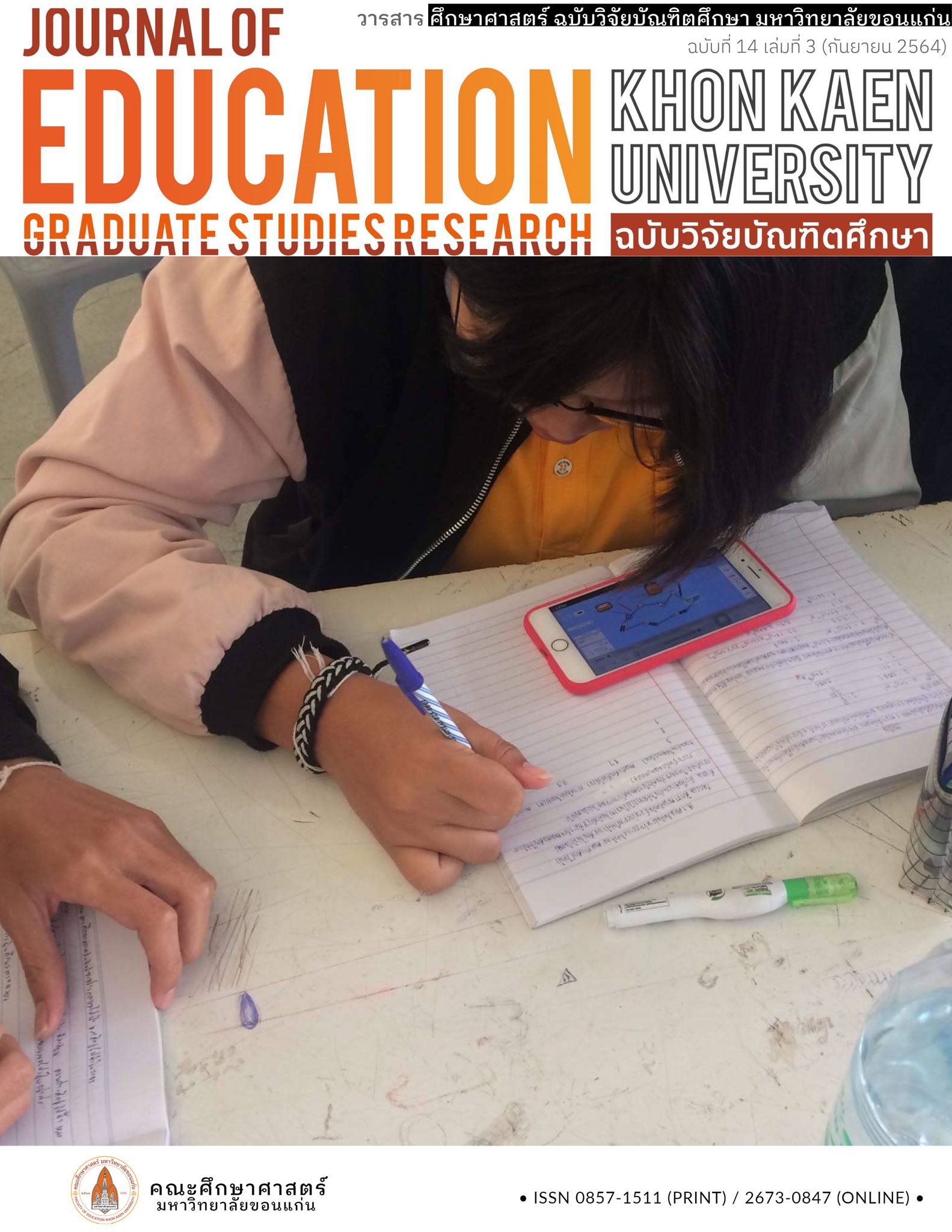Organizational Culture of Schools under the Secondary Educational Service Area Office Sisaket Yasothon
Main Article Content
Abstract
The purposes of this study were to study state, compare and recommendations of organizational culture of schools under the secondary educational service area office Sisaket Yasothon. The samples used in the study consisted of 438 people. The instruments were five-level rating scale and open-ended questionnaires with the reliability of 0.969. Data were analyzed statistically to reveal percentage, mean, standard deviation, t-test, F-test and Scheffé method. The research findings were as follows: The overall and each aspect results of state of organizational culture of schools under the secondary educational service area office Sisaket Yasothon were at high level. The overall result comparison of organizational culture of schools under the secondary educational service area office Sisaket Yasothon in term of working experiences was significantly different at the 0.01 level and the overall result in term of position and school position was significantly different at the 0.05 level. The recommendations of organizational culture of schools under the secondary educational service area office Sisaket Yasothon have expressed the most problem about team working and using rules. Recommendations organization should promote moral and relationship between people in organization and should administer by using good governance principle.
Article Details

This work is licensed under a Creative Commons Attribution-NonCommercial-NoDerivatives 4.0 International License.
References
จตุพร วิริยานุภาพ และสายสุดา เตียเจริญ. (2560). วัฒนธรรมองค์กรกับการบริหารงานบุคคลของสถานศึกษา ในสังกัดเทศบาลกลุ่มการศึกษาท้องถิ่นที่ 1. วารสารบริหารการศึกษา มหาวิทยาลัยศิลปากร, 8(1), 114-124.
จอมพงศ์ มงคลวนิช. (2555). การบริหารองค์กรและบุคลากรทางการศึกษา. กรุงเทพฯ : สถาบันเทคโนโลยีสยาม.
ชัยอานนท์ ภูมิลำเนา. (2560). การเสริมสร้างวัฒนธรรมองค์กรแบบมุ่งผลสัมฤทธิ์ ในโรงเรียนประถมศึกษา จังหวัดนนทบุรี.วิทยานิพนธ์ปริญญาศึกษาศาสตรมหาบัณฑิต สาขาการจัดการศึกษา วิทยาลัยครุศาสตร์ มหาวิทยาลัยธุรกิจบัณฑิต.
ชูตระกูล ไชยเสนา. (2560). ภาวะผู้นำการเปลี่ยนแปลงกับวัฒนธรรมองค์กรขององค์กรบริหารส่วนจังหวัดสิงห์บุรี. วารสารมหาวิทยาลัยราชภัฏธนบุรี, 11(1), 46-59.
ธนาพนธ์ ตาขันธ์, สุรัตน์ ดวงชาทม และวิจิตรา วงศ์อนุสิทธิ์. (2563). ปัจจัยวัฒนธรรมองค์กรที่ส่งผลต่อประสิทธิผลการบริหารงานบุคคลในโรงเรียน สังกัดสำนักงานเขตพื้นที่การศึกษามัธยมศึกษา เขต 23. วารสารการบริหารการศึกษาและภาวะผู้นำ มหาวิทยาลัยราชภัฏสกลนคร, 8(30), 44-52.
ปิยะณัฐ เริงเกษกรรม. (2561). วัฒนธรรมองค์กร ความผูกพันต่อองค์กรมีผลต่อพฤติกรรมการสร้างสรรค์นวัตกรรมของพนักงานในอุตสาหกรรมเครื่องใช้ไฟฟ้าและอิเล็กทรอนิกส์. วิทยานิพนธ์ปริญญาบริหารธุรกิจมหาบัณฑิต วิชาเอกการตลาด คณะบริหารธุรกิจ มหาวิทยาลัยเทคโนโลยีราชมงคลธัญบุรี.
พิชญาดา สิงหเลิศ. (2560). การบริหารสถานศึกษาตามหลักปรัชญาเศรษฐกิจพอเพียงของโรงเรียนในสหวิทยาเขตระยอง 2 สังกัดสำนักงานเขตพื้นที่การศึกษามัธยมศึกษา เขต 18. วิทยานิพนธ์ปริญญาศึกษาศาสตรมหาบัณฑิต สาขาวิชาการบริหารการศึกา คณะศึกษาศาสตร์ มหาวิทยาลัยบูรพา.
มาธินี คงสถิต และสมบูรณ์ สุขสําราญ. (2561). มหาวิทยาลัยราชภัฏกับการพัฒนาท้องถิ่น กรณีศึกษา เปรียบเทียบมหาวิทยาลัยราชภัฏในพื้นที่ท้องถิ่นชนบทและท้องถิ่นชุมชนเมือง. วารสารนวัตกรรมการบริหารและการจัดการ, 6(3), 1-10.
รพีภรณ์ แดงสาขา. (2561). ความสัมพันธ์ระหว่างวัฒนธรรมองค์กร กับประสิทธิผลองค์กรของสำนักงานตรวจคนเข้าเมือง. วารสารสังคมศาสตร์บูรณาการ, 5(1), 267–284.
รัชวดี แสงมหะหมัด. (2560). ความเหลื่อมล้ำทางการศึกษา: คุณภาพสังคมที่คนไทยมองเห็น. วารสารรัฐศาสตร์และรัฐประศาสนศาสตร์, 8(1), 33-66.
วาสนา รังสร้อย. (2564). ภาวะผู้นำและวัฒนธรรมองค์การที่มีผลต่อคุณภาพชีวิตการทำงานของบุคลากรครูโรงเรียนวัดลานบุญ สำนักงานเขตลาดกระบัง. วารสารมหาจุฬานาครทรรศน์, 8(2), 66-74.
วิรุฬจิต กลิ่นลออ และ สำเริง อ่อนสัมพันธุ์. (2562). วัฒนธรรมองค์การกับขวัญในการปฏิบัติงานของพนักงานครู โรงเรียนเทศบาลในกลุ่มการศึกษาท้องถิ่นที่ 1. วารสารศิลปกร ศึกษาศาสตร์วิจัย, 11(1), 224-240.
ศรีเรือน ยิ้มย่อง. (2559). การบริหารสถานศึกษาตามหลักปรัชญาของเศรษฐกิจพอเพียง ตามความคิดเห็นของผู้บริหารและครูสังกัดสำนักงานเขตพื้นที่การศึกษาประถมศึกษาชัยนาท สิงห์บุรีและอ่างทอง. วิทยานิพนธ์ปริญญาครุศาสตร
มหาบัณฑิต สาขาการบริหารการศึกษา บัณฑิตศึกษา มหาวิทยาลัยราชภัฏเทพสตรี.
สมาน อัศวภูมิ. (2553). การบริหารการศึกษาสมัยใหม่ แนวคิดทฤษฎี และการปฏิบัติ. อุบลราชธานี: อุบลกิจออฟเซทการพิมพ์.
อัจฉรา เมฆสุวรรณ. (2560). ความได้เปรียบในการแข่งขันของผู้ประกอบการวิสาหกิจขนาดกลางและขนาดย่อมประเภทอุตสาหกรรมแปรรูปการเกษตรภาคเหนือตอนบนของประเทศไทย. วารสารมหาวิทยาลัยราชภัฏยะลา, 12(ฉบับพิเศษ), 13-26.
Caraballo, F. E. (2016). Organizational Culture Comparisons of China and the United States Using the Denison Organizational Culture Model. (Ph.D. Dissertation). California: Alliant International University. Retrieved from https://www.academia.edu/29450709/Organizational_Culture_Comparison_of_China_and_the_United_States_Using_the_Denison_Organizational_Culture_Model.
Denison, D. (1990). Corporate Culture and Organizational Effectiveness. The Academy of Management Review, 16(1), 205-227.
Febriana, A., Wahyudi, S. and Suharnomo, S. (2019). Organizational Awareness and Participative Organizational Culture: The Effect on Proactive Behavior and Team Performance. Access La Success, 20(170), 25–31.
Hansen, M. (2018). Cultivating Change: The Relationship Between Organizational Culture, Leadership Style and Communication Style with Organizational Change. (Master Thesis). Marquette University. Retrieved from https://epublications.marquette.edu/cgi/viewcontent.cgi?article=1452&context=theses_open.
Krejcie, R. V. & Morgan, D. W. (1970). Determining Sample Size for Research Activities. Educational and Psychological Measurement, 30(3), 607-610.
McNeill, M. (2017). Leadership Influence to Transform Organizational Cultures. (Ph.D. Dissertation). Massachusetts: Simmons College. Retrieved from https://search.proquest.com/openview/59fca4374834f7e08706b02f89a60e59/1?pq-origsite=gscholar&cbl=18750&diss=y
Patterson, J. L., Purkey, S. C. and Parker, J. V. (1986). Productive School Systems for a Nonrational World. Alexandria, VA: Association for Supervision and Curriculum Development.
Robbins, S. P., and Coulter, M. (2007). Management. New Jersey: Pearson Prentice Hall.
Robbins, S. P. (1989). Organizational Behavior Concepts Controversies and Applications. Englewood Cliffs, NJ: Prentice-Hall.

